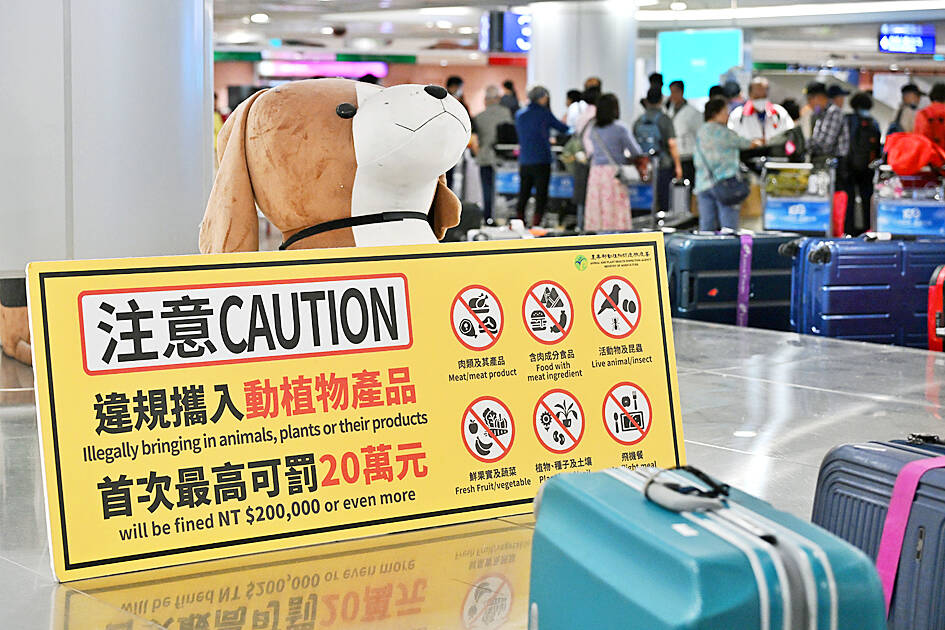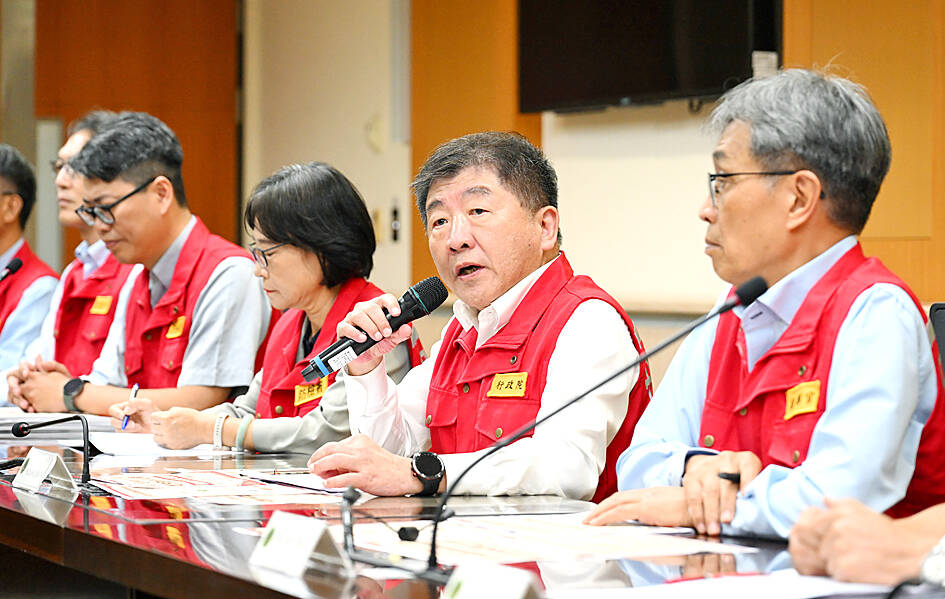Taiwan’s first African swine fever (ASF) case has been confirmed and would soon be reported to the World Organization for Animal Health (WOAH), Minister of Agriculture Chen Junne-jih (陳駿季) yesterday.
The Ministry of Agriculture’s Veterinary Research Institute yesterday completed the analysis of samples collected on Tuesday from dead pigs at a hog farm in Taichung and found they were ASF-positive.
Animal and Plant Health Inspection Agency Animal Quarantine Division chief Lin Nien-nung (林念農) said the result would be reported to the WOAH and Taiwan’s major trade partners would also be notified, adding that pork exports would be suspended.

Photo: Chen Yi-kuan, Taipei Times
As of Friday, all samples collected from 40 hog farms and a rendering plant linked to the African swine fever-affected farm through hog or carcass transport vehicles had tested negative, he said, adding that all involved kitchen waste collection trucks had been disinfected.
As the truck that delivered pigs to the Daan Meat Market had visited five slaughterhouses, the agency would also conduct inspections at those places, he said.
Local governments have inspected 4,165 hog farms as of yesterday, he said, adding that inspections of all 5,439 farms nationwide are expected to be completed by noon today.

Photo: Lin Cheng-kun, Taipei Times
The ministry has asked the Taiwan Frozen Meat Packers Association to help supply frozen pork to domestic sales channels amid the ban on transporting and slaughtering pigs, Lin said.
The national pork stockpile of 60,000 tonnes would be enough to meet domestic demand for a month, he said.
The 170,000 tonnes of chicken stockpile could be used as an alternative protein source and help meet demand for up to two months, he added.
The Ministry of Environment also launched fuel subsidy program for hog farms to assist in the transportation of kitchen waste to designated processing sites, Lin said.
Farms holding a reutilization certificate are eligible for the program, and the subsidy ranges between NT$500 and NT$1,167 per day, depending on the scale of the farm, he said.
Regarding the dead pig found on a beach in Lienchiang County, Lin said that tests have confirmed the pig had ASF.
The pig has been processed and buried, and the surrounding area has been cleaned and disinfected, he said, adding that the authorities have inspected all three hog farms in the county and found no abnormal deaths.
As some garbage found around the pig had simplified Chinese characters, the pig likely drifted to Taiwan from across the Strait, Lin said.
The agriculture ministry has announced a ban on transporting pork, perishable food and processed products from Lienchiang County for seven days from yesterday, he said.

Conflict with Taiwan could leave China with “massive economic disruption, catastrophic military losses, significant social unrest, and devastating sanctions,” a US think tank said in a report released on Monday. The German Marshall Fund released a report titled If China Attacks Taiwan: The Consequences for China of “Minor Conflict” and “Major War” Scenarios. The report details the “massive” economic, military, social and international costs to China in the event of a minor conflict or major war with Taiwan, estimating that the Chinese People’s Liberation Army (PLA) could sustain losses of more than half of its active-duty ground forces, including 100,000 troops. Understanding Chinese

The Ministry of Foreign Affairs (MOFA) yesterday said it is closely monitoring developments in Venezuela, and would continue to cooperate with democratic allies and work together for regional and global security, stability, and prosperity. The remarks came after the US on Saturday launched a series of airstrikes in Venezuela and kidnapped Venezuelan President Nicolas Maduro, who was later flown to New York along with his wife. The pair face US charges related to drug trafficking and alleged cooperation with gangs designated as terrorist organizations. Maduro has denied the allegations. The ministry said that it is closely monitoring the political and economic situation

UNRELENTING: China attempted cyberattacks on Taiwan’s critical infrastructure 2.63 million times per day last year, up from 1.23 million in 2023, the NSB said China’s cyberarmy has long engaged in cyberattacks against Taiwan’s critical infrastructure, employing diverse and evolving tactics, the National Security Bureau (NSB) said yesterday, adding that cyberattacks on critical energy infrastructure last year increased 10-fold compared with the previous year. The NSB yesterday released a report titled Analysis on China’s Cyber Threats to Taiwan’s Critical Infrastructure in 2025, outlining the number of cyberattacks, major tactics and hacker groups. Taiwan’s national intelligence community identified a large number of cybersecurity incidents last year, the bureau said in a statement. China’s cyberarmy last year launched an average of 2.63 million intrusion attempts per day targeting Taiwan’s critical

AGING: As of last month, people aged 65 or older accounted for 20.06 percent of the total population and the number of couples who got married fell by 18,685 from 2024 Taiwan has surpassed South Korea as the country least willing to have children, with an annual crude birthrate of 4.62 per 1,000 people, Ministry of the Interior data showed yesterday. The nation was previously ranked the second-lowest country in terms of total fertility rate, or the average number of children a woman has in her lifetime. However, South Korea’s fertility rate began to recover from 2023, with total fertility rate rising from 0.72 and estimated to reach 0.82 to 0.85 by last year, and the crude birthrate projected at 6.7 per 1,000 people. Japan’s crude birthrate was projected to fall below six,